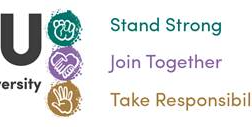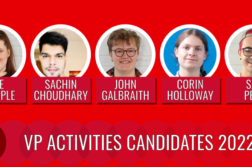The next academic year will be very different for all students, particularly in regard to the balance of online and in person teaching and student interaction on campus.
As a student, completing my degree over the last few months, I understand the importance of transparency from the university. It is crucial that the student voice is heard and acted upon in the decisions made regarding the delivery of their education. Students need a candidate who will listen to their concerns and fight to ensure that they are taken on board by the university. I believe I am that person.
Throughout my time at university, I have been involved in a range of societies, and have held three committee positions in my final year. Within these roles, I have worked collaboratively with my team to ensure that the needs of society members are always put first, and that activities such as fundraisers, socials and team training are carried out in a way in which all members can be involved.
Last year, I qualified as a First Aider with St John’s Ambulance, and I have volunteered at a number of sporting events hosted by the university. This responsibility has helped me to develop strong team working skills and the confidence and ability to perform well under pressure. I believe these skills, along with my drive and commitment to putting students first, make me the ideal candidate for VP Education & Democracy.
Whilst the previous Sabb team have made progress in key areas, such as the push for recording lectures to be mandatory, I believe that the methods in which students are able to make their voice heard leaves room for improvement. In my manifesto, I have stated that I intend to monitor and review the existing methods and procedures for student feedback. The current process is not clear and is ineffective. I need to look at roles and responsibilities and ensure that channels of communication are open and used to raise and address concerns for the benefit of all students.
Another key area is the awareness raising of the student union for first year students. I want to encourage student engagement with the union right from the beginning of their time at university. I will look to provide freshers with key information highlighting the role of the union, the benefits of its membership and how they can actively participate in what the union has to offer.
With such a low turnout, I understand why some students perceive these votes to be undemocratic and unrepresentative. However, the All-Student-Vote is currently seen to be the most effective method of gauging student opinion on important issues that require prompt action from SUSU.
If students feel dissatisfied with the current methods of voting on union matters, we need to revisit and review the process. We need to explore ways in which we can encourage greater participation in these votes, such as a stronger social media presence from the union. We need to provide more clarity on the voting process, and we need to provide more informed opinion and information on the key issues and the impact of the outcomes for all students.
My responsibility as VP Education & Democracy will be to make students aware of the relevance of these platforms and the opportunities that they provide to effect change for themselves and for others. I truly believe that if we can get this message across, we will be able to generate the interest and enthusiasm necessary for greater involvement and participation. Much of this engagement, over the coming academic year, will be done online. I see this as an exciting challenge to think creatively in terms of the dissemination of information and the opportunity to increase student interaction with the union.
In terms of what I would like to see students bring to these platforms, the key area will be the identification and removal of barriers to learning. I want students to put forward their suggestions, on any aspect of student life, and feel confident that I will take these into consideration and, where possible, act upon them to effect positive change.
The nature of politics is that inaction and lack of participation in the elective processes is, by default, an agreement that there is no need for change and a vote for the status quo. However, it is clear to me from the many conversations that I have had with my fellow students, that there are significant issues that students feel strongly about and there is an appetite for change. The disparity between low student turnout/lack of interest for positions of representation, and the belief that there are many issues in need of a change, suggests that students don’t feel the union is representative of them and don’t see it as an effective body in terms of initiating and fulfilling change
I want to reinforce the idea that the Sabbs team are here to work for students. We need to go back to basics and focus on the principle role of a student union; we need to listen, find out what the students want to happen and work to make this happen. Students need to see that they can action change whilst at their university. Only then will students see the union as something they want to engage with.
If, as representatives of the students, we can effect change, students will come to value the work of SUSU and see the roles of its members as opportunities worth investing their own time and effort in for the good of the students and the university.
The impact of the strikes has been uneven. Some students have been lightly affected, whilst others have experienced a detrimental effect on their studies. It would be useful to collect feedback from students on their individual experiences with UCU Strike Action, to better gauge its full impact.
Whilst it is the union’s role to represent the student body, it is also its responsibility to represent the interests of the individual. The union needs to be there to represent those who may feel that they have been disadvantaged disproportionately to other students. If students wish to escalate their concerns, it is the union’s role to signpost them in the right direction and support them in this process, if there is just cause to do so.
Moving forward, we will need to monitor students’ views towards the strikes, to see how these evolve over time. The union must ensure that it is adaptable and responsive to change. It must also ensure that it represents the current views of its student body on this matter and acts accordingly.
What is your opinion on making recorded lectures compulsory?
I strongly believe that the making of recorded lectures should be made compulsory. The current pandemic has further strengthened this conviction.
There are numerous benefits to recorded lectures. Students can access missed lectures, if they are unable to attend due to illness or unforeseen circumstances. If a student is unclear about a key point, they are able to review and reflect upon a recording to gain a better understanding in their own time, thereby avoiding any misconceptions or misunderstanding. I have personally found recorded lectures an invaluable tool during my revision and strongly believe that all students should have the right to access them as an integral part of their tuition.
Students have long advocated for making recorded lectures compulsory. If elected, I will work to see that this is introduced as soon as is feasibly possible.
One of the key points of my manifesto is parity and continuity. I want all students to access the benefits that the union can bring to the university. I will work with our current Disabilities Officer, and actively campaign to fill the Joint Honours and the remaining Postgraduate Research Officer roles, thereby ensuring all students are represented within the union, and have a point of contact for raising any concerns or suggestions. More importantly, I will work with these officers to address these concerns and, where possible, enable their suggestions to be implemented.
I want to reinforce the principle that my role is to support you, the students. I am here to represent your needs, concerns and suggestions. I want ALL students to see the union as THEIR union.
My top 3 areas of focus are:
From my own personal experience as a student at the University of Southampton, I strongly believe that all three will be crucial in going forward during the next academic year.
Universities globally are having to make tough, quick decisions regarding how they intend to carry out teaching next semester. I empathise with student fears in regard to the uncertainty surrounding the future of their learning at university.
One of the key points in my campaign is that I want to increase the number of digital academic resources available to students, to ensure that they get the most out of their learning, whether that be remotely, or lecture based. Building on the work of Laura and Jo, I want to gain student feedback on resources, activities and support that have proved useful whilst working from home. Having determined what works best for students, I will work with my colleagues to ensure that the university gets the right balance in terms of blended learning and provides the resources to ensure that learning is not compromised. Changes will have to come but we must make sure that they are to the benefit, and not the detriment, of all students across the full range of studies provided by the University of Southampton.
Students being off campus will result in student engagement, both academically and socially, undoubtedly looking very different in the coming academic year. We will need to look at new and innovative approaches that ensure that student life remains an enjoyable and rewarding experience.
Being a member of a number of societies, I have seen many ways in which students have kept up engagement with their communities throughout the pandemic. Activities such as zoom meetings, pub quizzes, virtual movie nights and even online fundraising campaigns have been very important in terms of maintaining social cohesion. Students are already looking at how they can build upon and strengthen communities over the next year, within the restraints of social distancing. I want to work with students to determine what they feel would work well, and how they would like to see student engagement with the university evolve over the next year.
This election has been unique in the sense that campaigning has been taking place completely online. This has enabled all candidates, including myself, to think creatively about their campaigns and how to engage with students online. If elected, I will use these skills, and those developed by other students, to further increase student engagement.
The pandemic has, and will continue, to provide us with challenges. With the support of myself and the student union, I firmly believe that current and future students of Southampton University can, and will, overcome these challenges.
You can access Katie’s manifesto here https://www.susu.org/elections/view/11507/katie-ludvigsen.html
Disclaimer: Wessex Scene reached out to all of those running for the role VP Education and Democracy, but were unable to reach some candidates.


